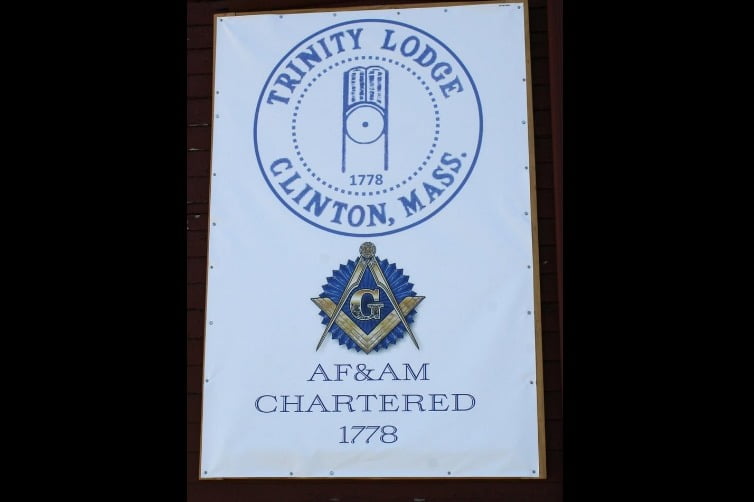
The original charter, signed when the nation was still fighting for its identity., was lost for decades, and the lodge was given a fresh charter, before it was found and then lost again.
“It is a great accomplishment for Trinity to receive its original charter and date again,” said lodge master Robert Aggas. “With all the history trying to be erased in the world, to regain part of that history and be a part of it, is a proud moment for me. And to be Master of the Lodge during this great event is an honor.”
Recovered in the mid-1800s and long lost in storage in the state lodge, the original charter is making something of a return to the lodge, Aggas said. The Trinity Lodge of the Ancient Free and Accepted Mason is now located on Main Street.
The original charter will remain in safekeeping, but when the Lodge celebrates its 240th year on Jan. 30, 2018, a full copy of the original will be presented to the Trinity Lodge, bringing back a piece of history reflecting the Masonic involvement in Lancaster and Clinton history.
“This means a great deal for me. I was the secretary when we celebrated our 150 years under the old charter,” member Greg Stahl said.
In 2008, when the grand master visited for the Clinton lodge’s 150th anniversary, based on the 1858 date, Stahl pointed out a carpet from 1784, which helped cement the earlier date. “The grand master said … if we could find the old charter, he would support us getting the old charter back.
“Eight years later, I finally was able to locate the old charter in the grand secretary’s vault. With the help of the Trinity Lodge officers, I drafted a letter to petition the Grand Lodge to restore the Jan. 31, 1778, precedence date and the original charter of Trinity Lodge. A great day indeed,” Stahl said.
That original charter for the lodge in Lancaster, worn over the decades as it was brought out to display to visitors, was signed on Jan. 30, 1778, lodge historian Paul Stevenson said. It was the fifth lodge chartered by the Massachusetts Grand Lodge.
Glued to a board to stabilize the much-handled document, now missing a corner, the charter was recovered in 1859. It was finally sent to the Grand Lodge in 1929, disappearing into the archives. While the 1858 charter bears similar wording to the original, Stevenson said, it lacks the signature of the famed patriot, Revere.
Among those who signed that charter were Paul Revere, an active member of the Masons, and Joseph Webb, who became the grand master for the state after General Joseph Warren was killed at the Battle of Bunker Hill, Stevenson said, citing the lodge and Masonic histories.
Revere attended several meetings of the Lancaster lodge over the years, Stevenson said.
“To finally be able to officially trace our lineage to Paul Revere, one of the original signers of the charter in 1778, and other founding members of Trinity Lodge will be a proud moment for us all,” member Craig Larson said. “The lodge and its leadership have been determined to have the original charter back in Clinton. Now it is attainable.”
There is a precedent for a lodge to return to its original date of establishment, Stahl said, pointing to the Morningstar Lodge in Worcester. That lodge was listed as older than Trinity even though it was developed from Trinity.
“I spent years looking for the charter. There was a rumor it was in the Grand Lodge secretary’s vault,” Stahl said. “It was a matter of putting it all together.” He was finally able to enlist the aid of Walter Hunt, who maintains the state archives and told him ”‘I know where it’s at,’” Stahl said.
Strahl said he found out the original charter was to be returned and the lodge’s establishment date altered just before he left earlier this year to move to Ohio.
“I was thrilled to find out we actually got the old charter back.” Speaking from out of state, however, Stahl said this week, “I never got to see it.” Stahl hopes to attend when the reproduction is presented to the Clinton lodge in January.
“I’m happy to have put some closure to this. It was sort of an open wound,” Stahl said.
Lodge history
The lodge met in numerous locations over the years and was meeting over John Thurston’s store in South Lancaster, in the early 1800s when members felt the anti-Masonic movement. It was there that the lodge recovered most of its paraphernalia when the fervor died down.
Masonic resurgence, and a new lodge in 1858 followed decades of decreased membership and Anti-Masonic political movements that included an Anti-Masonic Party, lodge historian Paul Stevenson said. Thus, many Masonic items went into hiding as the membership dwindled.
But, when the lodges started being revived, many things had changed. There was a new town, Clinton, in the former Lancaster village of Clintonville. And the original charter was missing.
When the current incarnation of the lodge was formed, the members sought to retrieve the original charter, but it could not be found, Stevenson said, and a new charter was issued in 1858. Finally, it was discovered in the possession of Stillman Rugg, of the Sterling family, in Lowell.